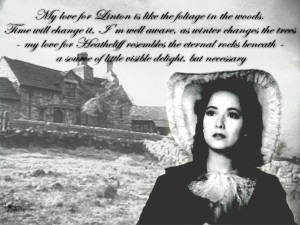I Might Have To Re-Read Wuthering Heights
 So last night I started out reading King Solomon’s Mines by Henry Rider Haggard (pub1885, seminal pulp fic, recommended by KJ Charles, great book), but after a while (like a couple hours) I decided to try something else. No real reason. KSM was totally fun and I was enjoying it, just wanted to noodle away at…okay yeah, I wanted to find a sex scene.
So last night I started out reading King Solomon’s Mines by Henry Rider Haggard (pub1885, seminal pulp fic, recommended by KJ Charles, great book), but after a while (like a couple hours) I decided to try something else. No real reason. KSM was totally fun and I was enjoying it, just wanted to noodle away at…okay yeah, I wanted to find a sex scene.
Hush, you.
Anyway, I turned to the historical romance Summer Is For Lovers by Jennifer McQuiston. I’d checked it out from the library after seeing it on one of last week’s Smart Bitches “books on sale” emails. This book has about a 4.5 star average on Amazon, and Smart Bitches gave it an A. The set-up was okay – decent characters, interesting setting – and I enjoyed the first kiss scene. I further enjoyed the first near-sex experience, but when I got to the following lines from the hero’s POV, I almost tossed the kindle across the room:
“Being ruined was not the worst thing to happen to an innocent like Caroline.
Being forced to marry someone like him was.”
The hero is referring to himself as a bad potential mate. All through the opening chapters, the author (a wee bit heavyhandedly) threaded the idea that the hero had, at some point in his past, broken a young girl’s heart, and therefore believed himself to be unworthy of the love of a good woman. The lines above were sort of the capstone, the clearest articulation of this idea, coming at about 25% of the way into the book.
A capstone, or maybe a roadblock, one with a sign saying “Proceed With Caution: Your patience will be sorely tried”.
Because, A. WHAT GUY EVER IN ANY TIME OR PLACE HAS THOUGHT THAT? Seriously? Do you know any (hetero, white) man who has made a conscious decision to stay single – forever(!) – because of a bad relationship?
AND
B. Would a hero from a novel written in whatever year this novel was set (vaguely Victorian-era) have thought that way? Would Heathcliff had said, “I’ve broken Cathy’s heart. Let me go off and brood in private.”? NOT. He went off and got rich, then came back and tortured everyone in the neighborhood. Mr. Rochester? Locked his crazy wife in in a room in the top floor and hooked up with Jane. Mr. Darcy? Got his snob on until Elizabeth figured out a way around it. People in the 19th century didn’t do angst, except a few who lived in a garrets, wrote atrocious poetry, and drowned their sorrows in opium and absinthe.
The hero in Summer Is For Lovers was the youngest son of a Baron, and therefore didn’t stand to inherit anything significant. If he had approached the problem as, ‘I can’t get involved with this innocent young thing because she has no dowry and neither do I’, I actually would have bought it. Starvation is a bad thing. But even the second son of a Baron had to have a pretty high opinion of himself. I mean, in those days people died young, and if his brother died without an heir, our hero is IT. He might not have all the advantages of an elder son, but he’s still better off than 99.99999% of the population.
The tortured hero is one of Romance’s favorite tropes, but I’d argue that one of the keys – and probably the hardest part – of writing historical fiction is giving your characters the right mental framework. King Solomon’s Mines is from the Victorian era, and it’s a solid example of the mindset. Sexism and racism were ubiquitous to the point of being almost unnoticeable, and there was little-to-no navel-gazing.
Did you hear that, Heathcliff? No navel-gazing.
It’s easy to be clunky when integrating historically-appropriate ideas into a story, and it’s tremendously difficult to weed out modern concepts that sneak in when your attention is elsewhere. Trust me on this. I’ve tried. I also have words for the first writing teacher who suggested giving characters a secret that gets revealed over the course of the story. I’m sure they meant well, but geez, does it have to happen in every novel, every time?
I don’t know whether I’m going to continue with Summer Is For Lovers or not, so this doesn’t really count as a review, just an observation about something that I reacted strongly to. While I may not care about the hero’s secret, traumatic past (oh please), Smart Bitches doesn’t give out A ratings to just anybody so it must be a pretty decent book. In my defense, however, the 1-star rating on Amazon was based on how the hero’s “over-the-top angst” was hard to take. It might be fun to keep on with my informal ‘compare and contrast’ - reading a couple chapters from a real Victorian novel, then a couple from a pseudo-Victorian.
Because, you know, sex scenes.
True confession time: can you think of an example of historical fiction where the modern bits bumped you out of the story? Either that, or do you have any pet peeves you’re willing to share?
Would love to see your comments…
Peace,
Liv



